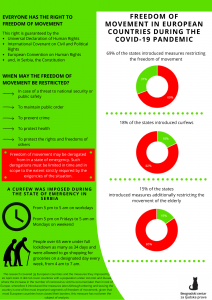The Belgrade Centre for Human Rights (BCHR) alerts the public to the inadmissible conduct of the Bogovađa Asylum Centre security guards, who verbally and physically abused the unaccompanied children living in the Centre. The BCHR filed a criminal report against the guards with the Ub Basic Public Prosecution Service. The incident also prompted a visit to the Centre by the Protector of Citizens on 15 May 2020.
An incident broke out at the Bogovađa Asylum Centre in the night of 11/12 May 2020, during which the guards of the company Dekapolit, contracted to maintain security of the Centre, physically and verbally abused the unaccompanied children living in the Centre. The video footage of the violence clearly shows a guard threatening the children and punching one child and hitting him with an object resembling a baton. The same group of children was intimidated by that guard when he found out that there was video footage of the incident and that the relevant authorities were notified of it.
In BCHR’s view, the conduct of the staff of the company contracted to maintain security in the Bogovađa Asylum Cenre includes elements of the crime of torture and ill-treatment under Article 137 of the Serbian Criminal Code. The BCHR filed a criminal report against the guards to the relevant prosecution service. The competent authorities ought to react urgently in this case since any kind of violence, including within institutions under the State’s jurisdiction, is inadmissible, especially when it is perpetratated against a particularly vulnerable category, such as children.
Given the risk of the violence recurring and that the children are intimidated by the abusers’ ongoing presence in the Centre, we call for their urgent removal from the Bogovađa Asylum Centre and any other facilities in which both refugees and migrants and nationals of Serbia reside. Such an urgent measure should be imposed immediately to protect the children now living in the Republic of Serbia and prevent any similar incidents in Asylum and Reception Centres in the future. Maintaining security of facilities such as Asylum Centres involves exercise of public powers, conferred upon the guards by the State, which is under the obligation to ensure it is not conferred upon abusers. We call on the prosecution service to immediately and thoroughly act on the criminal report given the particular vulnerability of children in the Bogovađa Asylum Centre and on the company Dekapolit to suspend its staff who took part in the incident pending the completion of the investigation and to dismiss them in the event they are found guilty of the crime.








